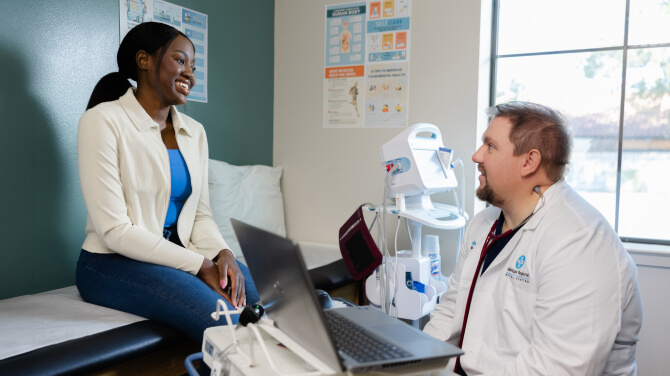What’s on the way for AI-native athenaOne
Artificial intelligence in healthcare isn't a distant disruptor. It’s already reshaping how ambulatory practices deliver care, streamline workflows, and strengthen financial performance. Providers are experiencing real gains in efficiency and patient engagement today, and expectations for AI-powered tools are only accelerating. At athenahealth, we’ve long led the way in optimizing clinical workflows, and now we’re building on that foundation with an AI-native athenaOne platform designed to embed intelligence seamlessly across every aspect of ambulatory care.
Here’s a preview of some of the exciting capabilities already rolling out in athenaOne, including clinical AI-powered tools, designed to meet the unique challenges of ambulatory practices.
Powering intelligent interoperability with real-time updates and automation
True transformation in ambulatory care requires not only powerful AI within a single platform but also intelligent interoperability across the healthcare ecosystem. AI-native athenaOne is advancing this with innovations that promise real-time, standardized communication across data sources, including:
- Next Generation Document Services: This AI enhancement extracts relevant information from faxes and transforms unstructured data into discrete, reportable data elements within the EHR. With millions of documents faxed across the healthcare ecosystem, this automation unlocks tremendous value for clinicians to reallocate their time to more meaningful elements of patient care. Moreover, Next Generation Document Services automatically labels clinical, imaging, and administrative documents as they are saved to patient charts.
- Model Context Protocol (MCP) Server: Leveraging athenaOne platform APIs, the MCP server will allow disparate AI models to communicate dynamically in real time and facilitate interaction among diverse data sources spanning practices, hospitals, public health registries, payers, data aggregators, and other EHR systems. The server structures the data to help provide insights and recommendations integrated directly into clinician workflows at the point of care—exactly when and where they are needed.
By providing real-time data updates and integrations, these AI innovations will help move ambulatory care beyond siloed systems and towards an intelligent, connected data ecosystem.
Smarter clinical workflows and enhanced care with AI-Native EHRs
Clinical documentation and care coordination can weigh heavily on clinicians, demanding valuable time and attention. Our AI-native intelligence layer, powered by smart machine learning and generative AI tools, serves as the foundation for these advancements. It integrates clinical, operational, and financial data, delivering AI-driven insights directly into clinician workflows to help reduce administrative burden and provide insights into servicing better patient care:
- Draft diagnosis and orders: Native AI can analyze encounter data and patient chart updates to help pre-fill diagnoses and orders, speeding up documentation and improving accuracy with real-time updates and any clinician revisions or inputs.
- Chart Assistant: Currently in the alpha phase, Chart Assistant uses generative AI as a data miner that scans all available clinical data to answer key questions or generate summaries across documents, charts, and clinical events relevant to individual patients. Clinicians can also ask the AI assistant, Sage, for data pulls that may prove vital in preparing for visits and in an effort to promote better patient encounters.
- Intelligent Summaries: Soon to enter alpha testing, these AI-powered overviews of diverse clinical data – including information regarding patient’s medical and social history – will enable clinicians to quickly access insights they need to make more informed decisions.
- Clinically inferred diagnoses: One of the exciting prospects of an AI-native EHR is its ability to harness predictive analytics. In this case, native AI will be able to leverage real-time updates from vitals, encounter summaries, lab results, and other patient chart data to help surface inferences and insights clinicians can use for diagnoses.
- Clinical document automation: Ambient tools within the AI-native EHR will include voice-to-text capabilities to summarize visits and speed up documentation to help improve same-day closure rates.
Ideally, using AI-native solutions in the clinical workflow will help clinicians prepare for encounters more efficiently, improve same-day documentation, and enhance care coordination, which may help drive better patient outcomes and limit “pajama time” for providers.
By providing real-time data updates and integrations, these AI innovations will help move ambulatory care beyond siloed systems and towards an intelligent, connected data ecosystem.
Using AI to boost patient engagement with proactive call-and-response
Patients have come to expect more, so practices must engage patients through timely, personalized communication that feels supportive and secure. This next generation of patient engagement AI technology leverages natural language understanding to comprehend and respond meaningfully to patient inquiries, automate routine communications, and promote continuous engagement throughout the care journey:
- Patient-facing AI assistants: These AI agents can securely communicate individual patient data in a conversational manner. AI-powered, two-way text messaging will give patients a window into their personalized health information.
- Appointment and waitlist management: Proactively communicates appointment reminders, follow-ups, and waitlist openings to reduce no-shows and optimize scheduling.
- Virtual front desk capabilities: Native AI will call upon geofencing and kiosk integration to recognize patient arrivals for easier check-in, also prompting them to complete essential tasks before check-out.
These patient engagement tools within AI-native athenaOne will help contribute to increased patient satisfaction. Happier patients can help increase retention rates, optimize revenue and improve patient-provider relationships.
Tapping into AI for RCM
Now that you have a sense of upcoming innovative AI tools that may help optimize clinical workflows and aid in patient outreach, what about revenue cycle management (RCM)? We’ve already harnessed the power of generative AI to help with things like insurance verification, and we’re working tirelessly to develop new solutions for financial workflows. That includes plans to harness AI-enabled coding and agentic AI to help practices maintain cash flow. Learn about athenahealth RCM solutions already available and stay tuned for exciting new developments to come.
The athenaOne AI-native advantage
By integrating native AI across clinical, financial, and patient engagement domains, athenahealth delivers a comprehensive platform that can help transform ambulatory care operations. AI-native athenaOne not only simplifies workflows but also future-proofs practices with thoughtful, secure AI deployments tailored to individual clinician and practice preferences. That includes optionality and the ability for clinicians to turn AI agents on or off within each workflow – ensuring technology is a complementary tool and giving clinicians the final say in key decisions.
Get a glimpse at some of the upcoming capabilities in athenaOne by requesting a demo. Find out how an AI-native EHR can help transform your practice and empower your team.










